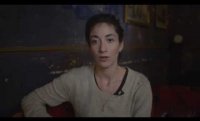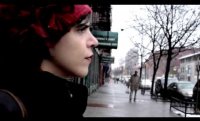Genre: Fiction
University of Wisconsin, Milwaukee
Rooms
Author Lauren Oliver discusses the inspiration for her novel Rooms (Ecco, 2014), a story about the secrets that haunt the living and the dead, and how they are intertwined with an old home.
Submissions Open for Doheny Book Award
Submissions are currently open for the second-annual Christopher Doheny Award, sponsored by the New York City–based Center for Fiction and Audible, Inc. The award is given for a book-length manuscript of fiction or creative nonfiction on the topic of serious physical illness. The award includes a $10,000 prize, along with publication and promotion of the book in print and audio editions.
Works by "a writer who has personally dealt or is dealing with life-threatening illness, either his or her own or that of a close relative or friend" are eligible. Writers must have previously published in literary journals or magazines, or have had a book published by an independent or traditional publisher. Previously unpublished manuscripts of any length written in English are eligible. Both adult and young adult works will be considered.
Writers should submit a manuscript along with a bibliography of published books, articles, or stories; a paragraph-long bio and contact information; if submitting an unfinished manuscript, a book proposal for the work being submitted and two sample chapters; if submitting a finished manuscript, a synopsis of up to two pages with the full manuscript. Submissions should be sent by e-mail to doheny@centerforfiction.org or by mail to the Christopher Doheny Award, Center for Fiction, 17 E. 47th Street, New York, NY 10017. The deadline is October 30. Visit the website for complete guidelines.
A panel of three distinguished writers and two representatives of Audible, Inc. will judge.
The winner of the 2013 award was Michelle Bailat-Jones for her novel Fog Island Mountains, forthcoming in November, about a South African expatriate living in a small town in Japan who faces a terminal cancer diagnosis. For those in New York City, Bailat-Jones will appear at the Center for Fiction on November 6 to discuss her novel.
The annual is named in honor of Christopher Doheny, who was diagnosed with cystic fibrosis when he was an infant and worked for Audible, Inc. for eight years. He passed away in February 2013.
Gone Girl
Author Gillian Flynn discusses the structure of her novel Gone Girl (Crown Publishing Group, 2012), and how it reflects the tug of war between a couple entwined in a troubled marriage. Flynn wrote the screenplay for the film adaptation released today.
Valeria Luiselli
Valeria Luiselli talks about the inspiration for her books Sidewalks and Faces in the Crowd, both translated from Spanish by Christina MacSweeney and published earlier this year by Coffee House Press. Luiselli was recently named one of the National Book Foundation’s 5 Under 35 for 2014.
Waterfall
The soothing sound of water pouring over rocks, the spray that mists your face as you stand at the bottom looking up—waterfalls have such power and grace. This week, write a short scene in which one of your characters discovers a waterfall on a walk through the woods. What’s her first instinct? Does she dive into the pool at the bottom for a swim? Or does she stand back in awe?
Station Eleven
This novel by Emily St. John Mandel, published by Knopf this month, tells the story of a theatre troupe and their survival through a deadly plague. The book is longlisted for the 2014 National Book Award in Fiction.
University of Saskatchewan
Red Hen Press and the Annenberg Community Beach House Series
Red Hen Press, founded by Kate Gale and Mark E. Cull, has been a part of the Los Angeles publishing world since 1994 and remains one of the few literary presses in the city. Red Hen hosts a series at the historic Annenberg Community Beach House in Santa Monica. A P&W–supported reading on September 9, 2014 featured poets Afaa Michael Weaver, Douglas Kearney, Brett Fletcher Lauer, and Robin Coste Lewis and was moderated by Red Hen Press founder Kate Gale. R&W (West) program assistant, Brandi M. Spaethe, attended the reading and writes on her experience.

My first time at the Annenberg Community Beach House, I arrived when the sun was still just high enough to sink into the ocean as four wonderful poets read their work. One reader commented: “How can I compete with that?” The audience faced the reader who faced a wall of windows. We were all part of the spectacle for each poet who stood at the podium. They were a reflection of the setting sun and the turn of day to night.
In the 1920s, William Randolph Hearst erected a mansion for Marion Davies on the site where the Annenberg Community Beach House currently resides, and it became a place for Hollywood stars to congregate. Joseph Drown purchased the house from Davies in the 1940s and converted the property into a hotel and beach club. Many years later, the state took over and continued to run it as a beach club until the Northridge earthquake in 1994 damaged all properties on site. The Annenberg Community Beach House was built via a grant from the Annenberg Foundation as a place for the Santa Monica community and surrounding communities.
Red Hen Press has sparked a tradition of poetry at the beach house with past readers who include Susan Straight, Ilya Kaminsky, Camille T. Dungy, and Ron Carlson. One of the night’s readers, Brett Fletcher Lauer from Brooklyn, New York, joked with me about arriving far ahead of schedule due to a warning from the locals about the traffic. He said it gave him a chance to sit outside the beach house and enjoy the scenery. After the reading, P&W–supported writer Douglas Kearney waxed poetic about the ocean at night and how daunting a thing it was. Many of us made note of the space, commenting on its magic.
First to the podium was Robin Coste Lewis, who is currently in the PhD in creative writing program for poetry at the University of Southern California. Her elegance and poise matched the power of her words while the low sun highlighted her beautiful ensemble. Brett Fletcher Lauer read work from his recent book A Hotel in Belgium, making note of its darkness, which was never deprecating or pitiful, but rather stunning in its revelations—enough to make you consider your own station. P&W–supported poet Douglas Kearney, in true Kearney fashion, shifted the tone of the reading with eye-opening crescendos and anaphoras from his published work, including his most recent book of poetry, Patter. His performance asked us to sit up and pay attention. The sun sank lower, almost out of sight now, almost gone. The final note, and a rising one, was P&W–supported poet Afaa Michael Weaver. He shared poems from a variety of his publications with a wisdom that seemed to come from a life of having seen much darkness and written through it. The audience listened intently, catching its breath as he delivered each line.
Red Hen Press will host the next Annenberg Community Beach House reading on October 14th at 6:30 PM, featuring Leia Penina Wilson, Genevieve Kaplan, Jessica Piazza, and Mary Johnson. The readings are free. More information can be found here.
Major support for Readings & Workshops in California is provided by the James Irvine Foundation. Additional support comes from the Friends of Poets & Writers.








